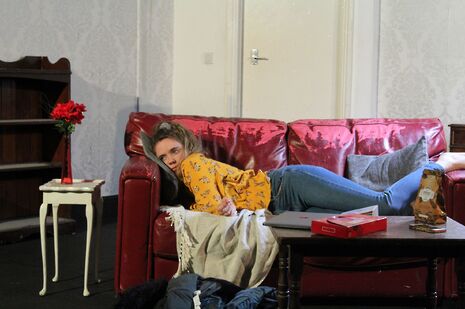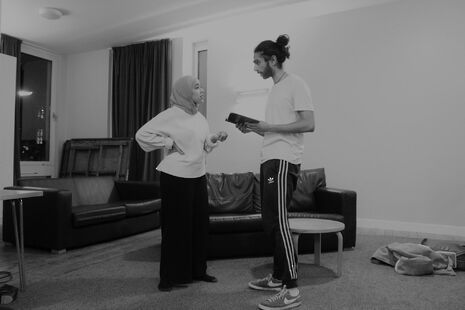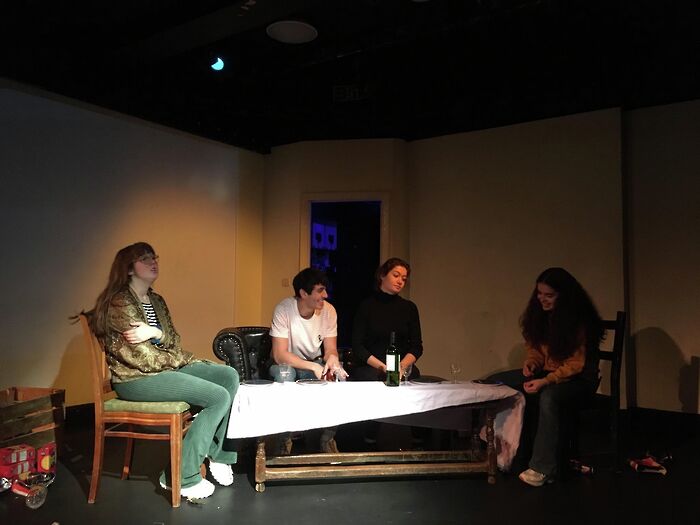Belleville review
This is a scintillating psychological thriller posing as a marital drama, crafted and delivered by a talented cast and production team

“We are strangers in a strange land,” declares Belleville’s female protagonist, Abby. And she isn’t wrong; this is a play which is all about location: from the invasion of a quaint Parisian milieu by two American expats, to the desperate desire for escape which underlies the whole narrative, Belleville uses its location as a springboard with which to examine its characters.
Perhaps aptly, therefore, it is evident even before the start of the play that a huge amount of effort has gone into the decoration of the Corpus Playroom: an impression of homely domesticity is created by carefully selected furniture, whilst the French background music reminds us of the Parisian setting. Clearly, the director (Erika Price) has crafted her vision of the apartment in painstaking detail, and it so follows that the protagonists of the play, Abby (Kay Benson) and Zack (Jamie Sayers) have done the same. Indeed, Abby and Zack appear to occupy a small portion of paradise; both young professionals, they have moved to Paris from New Jersey, apparently in the hope of enacting the romantic cliché of the newly-wedded couple in the city of love.
And yet Belleville slowly unveils a series of chinks in their marital bliss: the cosy domestic setting of their marriage belies a precarious financial situation, which in turn reveals a web of lies surrounding Zack’s job, as well as Abby’s decline in mental health. Soon the audience realises that this is a scintillating psychological thriller, merely posing as a marital drama; a series of events ultimately shatter the cosy fiction which the couple have built up for themselves. It is a profoundly intimate portrayal of the illusion of harmony in relationship; flawed, hedonistic and raw with sexual detail, Sayers and Benson are utterly convincing in their conveyance of the lustful attraction between their characters, a small detail which could make or break a play which rests on the believability of its protagonists.

Together, the two actors portray a deeply flawed couple whose sexual chemistry and initial marital unity mask deep rooted insecurities; Sayers presents a Zack whose outward masculinity hides a fundamentally controlling interior, whilst Benson’s portrayal of Abby as a bustling house-wife soon gives way to the realisation that she suffers from serious mental health issues. Both members of the couple are prone to escapist tendencies – for Zack, marijuana, for Abby, anti-depressants, and yet they both appear to reconcile their emotional difficulties through love-making.
"flawed, hedonistic and raw with sexual detail, Sayers and Benson are utterly convincing in their conveyance of the lustful attraction between their characters"
By contrast, their landlords Amina (portrayed by Imane Bou-Saboun) and Alioune (Anand Joshi), present a fascinating counterpoint to the marriage of Zack and Abby; whereas the marriage of the latter couple breaks down through a series of lies and miscommunications, Amina and Alioune demonstrate the way in which an open and honest dialogue can sustain even the shakiest of marriages. Although Bou-Saboun and Joshi’s performance was not only genuinely convincing but also remarkably touching, I could not help but feel that their main function was to act as a counterpoint to Zack and Abby, and to advance the movement of the plot. As such, I struggled to get a proper sense of them as the well-rounded characters which they had the potential to be (although this was of course, a problem with the script, rather than with the performance itself).
The play also, at times, has the potential to devolve into excessive sentimentality: ‘let’s not be melodramatic’ declares Zack, in what functions as the play’s attempt at self-effacing its own melodrama by drawing attention to it. And yet, Belleville manages to fall just on the right side of the border between ‘intense’ and ‘melodramatic’: the play reaches its narrative climax as the consequences of Abby’s wavering mental health, and Zack’s web of lies comes to the surface of their insular marital bubble. Sayers and Benson are perhaps at their strongest when depicting the identity of their characters in crisis, but credit should also once again be given to a fantastic set design: as Zack and Abby’s marital fiction gradually falls apart, so does the domestic atmosphere of the set. By the end of the play, the image of an empty home strewn with the physical remnants of marital dispute functions as a powerful image of the corruption that lies dormant in this relationship.
‘What are we doing here?’ asks Abby at the end of the play, echoing a very similar question from the start. Except the first time she asked it, she was, of course, talking about location. One gets the sense that by the end of Belleville, the question is rather more existential. Perhaps this movement from the locational to the existential also reflects the thematic movement of Belleville itself – this is a play which uses location, set, and lighting remarkably effectively in order to explore deeper issues of mental health, immigration, control and marriage. Although it has its moments of weakness (mostly regarding the script itself, rather than the production), Belleville is a beautifully crafted and very convincing piece, advanced by a talented cast and production team who all partake in its creative vision.
 News / Caius mourns its tree-mendous loss23 December 2025
News / Caius mourns its tree-mendous loss23 December 2025 Comment / Yes, I’m brown – but I have more important things to say22 December 2025
Comment / Yes, I’m brown – but I have more important things to say22 December 2025 News / Clare Hall spent over £500k opposing busway 24 December 2025
News / Clare Hall spent over £500k opposing busway 24 December 2025 Interviews / Politics, your own way: Tilly Middlehurst on speaking out21 December 2025
Interviews / Politics, your own way: Tilly Middlehurst on speaking out21 December 2025 News / King appoints Peterhouse chaplain to Westminster Abbey22 December 2025
News / King appoints Peterhouse chaplain to Westminster Abbey22 December 2025









